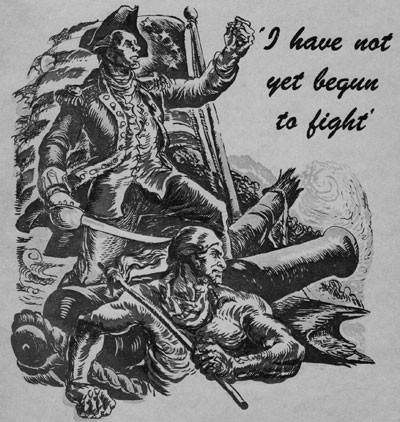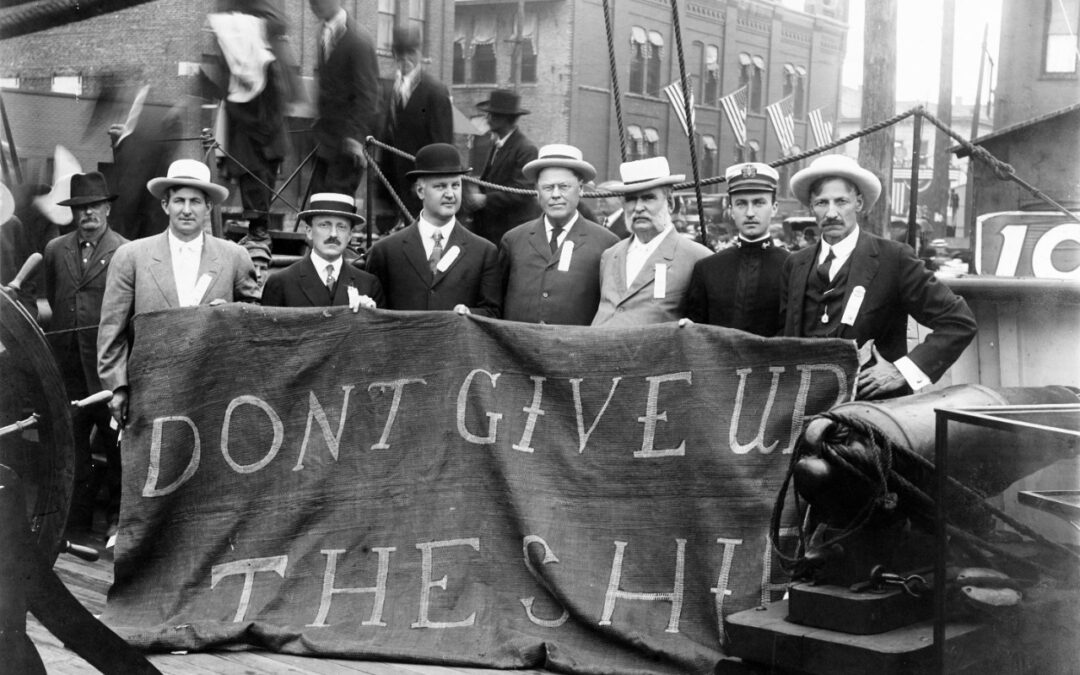Discover, share, and learn the origins of some of the best-known Navy quotes and sayings.

“…without a Respectable Navy, Alas America!”
Captain John Paul Jones, 17 October 1776, in a letter to Robert Morris.
“I have not yet begun to fight!”
Captain John Paul Jones said this during the famous battle between Bonhomme Richard and Serapis on 23 September 1779. It seems that some of Jones’ men cried for surrender, but not John Paul Jones. Captain Richard Pearson of Serapis asked Jones if he had surrendered. Jones uttered the immortal words: “I have not yet begun to fight!” So, at least, Lt. Richard Dale later recalled.
“I wish to have no Connection with any Ship that does not Sail fast for I intend to go in harm’s way.”
Captain John Paul Jones, 16 November 1778, in a letter to le Ray de Chaumont.
[Morison, Samuel Eliot. John Paul Jones: A Sailor’s Biography. (Boston: Little, Brown and Company)
“It follows then, as certain as that night succeeds the day, that without a decisive naval force we can do nothing definitive, and with it, everything honorable and glorious.”
President George Washington, 15 November 1781, to Marquis de Lafayette.
[The Writings of George Washington from the Original Manuscript Sources 1745-1799. vol.23. (Washington, D.C.: U.S. Government Printing Office, 1937): 341.]
“Don’t give up the ship!”
Tradition has it that Captain James Lawrence said these heroic words after being mortally wounded in the engagement between his ship, the U.S. frigate Chesapeake, and HMS Shannon on 1 June 1813. As the wounded Lawrence was carried below, he ordered “Tell the men to fire faster! Don’t give up the ship!”
Although Chesapeake was forced to surrender, Captain Lawrence’s words lived on as a rallying cry during the war. Oliver Hazard Perry honored his dead friend Lawrence when he had the motto sewn onto the private battle flag flown during the Battle of Lake Erie, 10 September 1813. [William S. Dudley, ed., The Naval War of 1812: A Documentary History. vol. 2 (Washington, D.C.: U.S. Government Printing Office, 1992): 559]
“We have met the enemy and they are ours…”
Oliver Hazard Perry’s immortal dispatch to Major General William Henry Harrison after the Battle of Lake Erie, 10 September 1813, “We have met the enemy and they are ours– two ships, two brigs, one schooner and one sloop.” The victory secured the Great Lakes region for the United States and ended the threat of invasion from that quarter.
[William S. Dudley, ed., The Naval War of 1812: A Documentary History. vol.2 (Washington, D.C.: Naval Historical Center, 1992): 553.]
“You may fire when you are ready Gridley.”
Commodore George Dewey, 1 May 1898, at the Battle of Manila Bay during the Spanish-American War. The American squadron entered Manila Bay and took fire from the Spanish fleet, anchored under the guns of Cavite, for half an hour until in the position Dewey wanted. Then Dewey addressed his order to Charles Gridley, captain of Dewey’s flagship Olympia. [Dewey, George. Autobiography of George Dewey, Admiral of the Navy. (New York: Charles Scribner’s Sons, 1913) 214.]
“A good Navy is not a provocation to war. It is the surest guaranty of peace.”
President Theodore Roosevelt, 2 December 1902, second annual message to Congress.
“A powerful Navy we have always regarded as our proper and natural means of defense; and it has always been of defense that we have thought, never of aggression or of conquest. But who shall tell us now what sort of Navy to build? We shall take leave to be strong upon the seas, in the future as in the past; and there will be no thought of offense or provocation in that. Our ships are our natural bulwarks.”
President Woodrow Wilson, 8 December 1914, An Annual Message to Congress.
[Link, Arthur S. ed. The Papers of Woodrow Wilson. vol. 31. (Princeton University Press, 1979): 423]
“Praise the Lord and pass the ammunition!”
Lieutenant Howell Maurice Forgy, USN (ChC), serving in the heavy cruiser USS New Orleans (CA-32) during the Japanese attack on Pearl Harbor on 7 December 1941, is credited with coining the phrase. Lieutenant Forgy saw the men of an ammunition party tiring as they labored to bring shells to the antiaircraft guns. Barred by his non-combatant status from actively participating in keeping the guns firing, Lieutenant Forgy decided that he could add his moral support to the ammunition bearers through words of encouragement, and so patted the men on the back and said, “Praise the Lord and pass the ammunition!”
His words were later popularized in a song written by Frank Loesser and performed by Kay Kyser and his orchestra. [Hohenstein, Captain Raymond Charles, Chaplain Corps, U.S. Navy (Retired). Interview by Commander H. Lawrence Martin, Chaplain Corps, U.S. Navy. Transcript. (Oral History Program of the Chaplain Corps of the United States Navy, 1983): 27-29.]
“I can imagine no more rewarding a career. And any man who may be asked in this century what he did to make his life worthwhile, I think can respond with a good deal of pride and satisfaction: ‘I served in the United States Navy.’”
President John F. Kennedy, 1 August 1963, in Bancroft Hall at the U.S. Naval Academy.
[Public Papers of the Presidents of the United States: John F. Kennedy, Containing the Public Messages, Speeches, and Statements of the President, January 1 to November 22, 1963 (Washington, D.C.: U.S. Government Printing Office, 1964), 620]
Read more famous Navy quotes at Naval History and Heritage Command.

